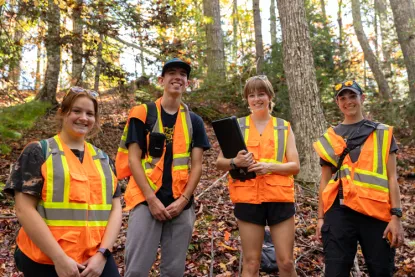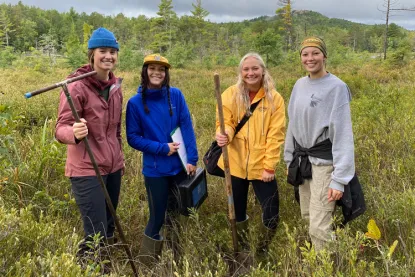
Program Overview
The Environmental Science (ENV) major provides students with a comprehensive and interdisciplinary educational experience that prepares them for careers in natural and physical science. This program equips students with the skills to examine, analyze, and understand the complex dynamic interaction of physical, chemical, biological, and social systems, and collaborate to resolve complex environmental problems.
By emphasizing professional skills training, including field, laboratory, and computer based methods, our faculty help students gain applied science knowledge. Experiential hands-on learning prepares graduates for environmental careers in natural resource management, environmental assessment, pollution control, remediation of contaminated sites, and renewable energy technologies.

Learning Objectives
- Identify and describe fundamental properties of physical, biological, and social systems and their interconnections.
- Explain key geographic and environmental science concepts and relate them to patterns created by interconnected physical, biological, and social systems and processes across multiple spatial scales.
- Assess environmental problems or geographic issues through the collection or compilation of quantitative (and appropriate qualitative) data and application of appropriate analysis methods.
- Create documents and presentations that synthesize qualitative and quantitative information relating to physical, biological, and social systems and their interconnections and provide avenues for any or all of the following: a) implementing a solution b) informing a decision, or c) future work.

Skills and Competencies
The Environmental Science major’s course work will develop critical thinking, problem solving, and decision-making abilities. Strong communication skills, including writing and speaking, are essential for a career in this field. Leadership skills are also beneficial. Environmental Scientists must be proficient in technical skills including Geographic Information Systems (GIS) and other computer skills, quantitative data analysis, ecological principles, and analytical chemical procedures. Students also become familiar with environmental policy and regulations. Many of these skills will be developed by hands-on experiences in the field (outdoors) and in the laboratory. Internships and study abroad can enhance the learning.
Our Geographic Information Systems Certificate Program allows students to integrate Environmental Science with the latest computer-based mapping technologies. Earn credits for this certificate program while working toward your degree.

What can you do with an Environmental Science degree?
This program helps students prepare for employment in many careers including, but not limited to, the following:
- Air Quality Manager
- Conservation Officer
- Environmental Chemist
- Environmental Consultant
- Environmental Educator
- Environmental Impact Analyst
- Environmental Interpreter
- Environmental Lawyer
- Environmental Manager
- Environmental Planner
- Environmental Policy Specialist
- Environmental Scientist
- Environmental Technician
- GIS Analyst
- Hazardous Materials Specialist
- Natural Resources Manager
- Organic Farmer
- Pollution Control Technician
- Public Health Officer
- Recycling Coordinator
- Renewable Energy Specialist
- Risk Assessment Specialist
- Soil Conservation Scientist
- Sustainable Forestry Consultant
- Water Resources Specialist
- Water Quality Manager
- Wildland Firefighter
Affiliated Faculty

Kathleen Henry
Contingent Instructor
khenry@nmu.edu 906-227-2500Office Location:
3109 Weston Hall

Adam Naito
Assistant Professor
anaito@nmu.edu 906-227-1174Office Location:
3007 Weston Hall

Matthew Van Grinsven
Associate Professor
mvangrin@nmu.edu 906-227-1161Office Location:
3117 Weston Hall / 3612 The Science Building

Richard Ziegler
Contingent Senior Instructor
rziegler@nmu.edu 906-227-1364Office Location:
3608 The Science Building

Susy Ziegler
Professor, Interim Dean of the College of Graduate Studies & Research
suziegle@nmu.edu 906-227-1104Office Location:
401B Cohodas Hall
Environmental Science Major Requirements
Environmental Science Core 30 Credits
- GC 100 - Physical Geography [SCII] 4 Credits or
- GC 101 - Introduction to Environmental Science [INTT] 4 Credits
- GC 202 - Soils 4 Credits or
- GC 255 - Physical Geology [SCII] [LAB] 4 Credits
- GC 205 - Introduction to Geographic Research 4 Credits
- GC 225 - Introduction to Maps 2 Credits
- GC 235 - Quantitative Methods 4 Credits
- GC 320 - Environmental Policy and Regulation 4 Credits
- GC 335 - Geographic Information Systems 4 Credits
- GC 488 - Earth and Environmental Science Capstone Research 4 Credits or
- GC 489 - Human-Environment Capstone 4 Credits
Concentration 16 Credits
Choose 16 credits from one of the following concentrations, with no more than 12 credits from one prefix without prior approval.
In a time of rapid ecological change, we must have environmental scientists with training in natural resources to apply practical and scientific solutions to current and emerging human–environmental challenges. Our students pursuing a Natural Resources concentration prepare for various jobs related to resource and land management, conservation, restoration, GIS, environmental planning and protection, and recreation through hands-on, experiential learning in indoor and field-based classes and service-learning opportunities with local businesses and non-profit organizations. Graduates can pursue careers in invasive species control, ecological restoration, endangered species conservation, and resource management in non-profit organizations, government agencies, and private industry.
Required course: 4 Credits
- BI 210 - Principles of Ecology [SCII] [LAB] 4 Credits
Natural Resources Electives
At least two courses, from two different prefixes, must be 300 level or higher: 12 Credits
- BI 240 - Conservation Biology 4 Credits
- BI 310 - Ecology Theory and Methods 4 Credits
- BI 330 - Applied Plant Science 4 Credits
- BI 412 - Biostatistics 4 Credits
- BI 431 - Plant Physiology 4 Credits
- BI 441 - Fisheries Management 4 Credits
- BI 442 - Wildlife Management 4 Credits
- BI 466 - Stream Ecology 4 Credits
- COM 432 - Environmental Communication 4 Credits
- EC 345 - Environmental and Natural Resource Economics 4 Credits
- GC 210 - Earth Hazards [SCII] 4 Credits
- GC 285 - Earth’s Climate: Past, Present, and Future 4 Credits
- GC 362 - Wetlands 4 Credits
- GC 370 - Geomorphology 4 Credits
- GC 390 - Oceanography 4 Credits
- GC 401 - Biogeography 4 Credits
- GC 425 - Remote Sensing 4 Credits
- GC 428 - Spatial Analysis 4 Credits
- GC 431 - Landscape Dynamics and Analysis 4 Credits
- GC 465 - Hydrology 4 Credits
- GC 475 - Environmental Impact Assessment 4 Credits
- GC 482 - Earth Systems Interactions 4 Credits
- GC 491 - Internship 2-6 Credits
- RE 172 - Introduction to Wildland Firefighting 3 Credits
- RE 271 - Protected Area Management 4 Credits
Noise, air, water, and soil pollution negatively impact the environment. Mitigating these problems improves overall human and ecosystem health. Our environmental science students pursuing the Pollution Control and Remediation concentration gain comprehensive knowledge of environmental pollution, remediation technology, environmental analysis, environmental impact assessments, and local/state/federal laws and regulations. In addition, these students gain experience analyzing the fate of environmental pollutants, quantifying these pollutants, and identifying strategies for their remediation. Our graduates may be prepared for careers in which they collaborate with fellow scientists and stakeholders to develop policies to minimize pollution and procedures to clean up the environment.
Required courses: 5 or 8 Credits
- CH 220 - Introduction to Organic Chemistry 5 Credits or
- CH 315 - Organic Chemistry I 3 Credits and
- CH 317 - Organic Chemistry Laboratory I 1 Credits and
- CH 325 - Organic Chemistry II 3 Credits and
- CH 327 - Organic Chemistry Laboratory II 1 Credits
Pollution Control and Remediation Electives
At least two courses, from two different prefixes, must be 300 level or higher: 8-11 Credits
- BI 460 - Ichthyology 4 Credits
- BI 465 - Aquatic Insect Ecology 4 Credits
- CH 241 - Chemical Equilibrium 3 Credits
- CH 242 - Quantitative Analysis 2 Credits
- CH 435 - Gas and Liquid Chromatography 2 Credits
- CH 450 - Biochemistry I 4 Credits
- CH 452 - Biochemistry II 4 Credits
- CH 454 - Biochemical Techniques 4 Credits
- GC 362 - Wetlands 4 Credits
- GC 385 - Weather and Climate 4 Credits
- GC 425 - Remote Sensing 4 Credits
- GC 428 - Spatial Analysis 4 Credits
- GC 431 - Landscape Dynamics and Analysis 4 Credits
- GC 465 - Hydrology 4 Credits
- GC 475 - Environmental Impact Assessment 4 Credits
- GC 482 - Earth Systems Interactions 2-4 Credits
- GC 491 - Internship 2-6 Credits
With ongoing challenges related to the extraction and distribution of resources to support our energy needs, harnessing sustainable and renewable resources like wind, sunlight, biofuels, geothermal heat, and rivers is increasingly vital. An environmental scientist trained in renewable energy technologies can address real-world social, economic, and technical sustainability issues, and work with relevant stakeholders to develop and implement renewable energy facilities in communities. Our graduates are prepared to collaborate with engineers, planners, and public policy experts in the public and private sectors.
Required course: 4 Credits
- GC 342 - Energy and the Environment 4 Credits
Renewable Energy Technologies Electives
- GC 269 - Introduction to Sustainability 4 Credits
- GC 285 - Earth’s Climate: Past, Present, and Future 4 Credits
- GC 385 - Weather and Climate 4 Credits
- GC 425 - Remote Sensing 4 Credits
- GC 428 - Spatial Analysis 4 Credits
- GC 491 - Internship 2-6 Credits
- PH 393 - Experimental Instrumentation and Analysis 4 Credits
- REN 200 - Introduction to Renewable Energies 3 Credits
- REN 221 - Solar Power 3 Credits
- REN 222 - Wind Power 3 Credits
- REN 230 - Bioenergy 3 Credits
Water scarcity is currently one of the most challenging issues facing societies worldwide. Competition for access to clean water is expected to intensify in the 21st century. An environmental scientist in water resources can apply knowledge of biology, chemistry, geoscience, hydrology, limnology, meteorology, and soil science to manage water for habitat and human use. Career activities may span inventory, data collection, and analysis of water use, quality, and pollution. Solutions are developed with various organizations and stakeholders (e.g., tribal governments, municipalities, private landowners, and non-profit organizations) that often have different interests in lands, resources, and programs.
Required course: 4 Credits
- GC 465 - Hydrology 4 Credits
Water Resources Electives
At least two courses, from two different prefixes, must be 300 level or higher: 12 Credits
- BI 210 - Principles of Ecology [SCII] [LAB] 4 Credits
- BI 314 - Introduction to Marine Biology 4 Credits
- BI 410 - Ecology of the Great Lakes 4 Credits
- BI 411 - Limnology 4 Credits
- BI 412 - Biostatistics 4 Credits
- BI 441 - Fisheries Management 4 Credits
- BI 465 - Aquatic Insect Ecology 4 Credits
- BI 466 - Stream Ecology 4 Credits
- CH 220 - Introduction to Organic Chemistry 5 Credits or
- CH 315 - Organic Chemistry I 3 Credits and
- CH 317 - Organic Chemistry Laboratory I 1 Credits and
- CH 325 - Organic Chemistry II 3 Credits and
- CH 327 - Organic Chemistry Laboratory II 1 Credits
- GC 285 - Earth’s Climate: Past, Present, and Future 4 Credits
- GC 362 - Wetlands 4 Credits
- GC 370 - Geomorphology 4 Credits
- GC 385 - Weather and Climate 4 Credits
- GC 390 - Oceanography 2 Credits
- GC 425 - Remote Sensing 4 Credits
- GC 428 - Spatial Analysis 4 Credits
- GC 431 - Landscape Dynamics and Analysis 4 Credits
- GC 475 - Environmental Impact Assessment 4 Credits
- GC 482 - Earth Systems Interactions 2-4 Credits
- GC 491 - Internship 2-6 Credits
Other Required Courses 27 Credits
- BI 111 - Introductory Biology: Principles [SCII] [LAB] 4 Credits
- BI 112 - Introductory Biology: Diversity 4 Credits
- CH 111 - General Chemistry I [SCII] [LAB] 5 Credits
- CH 112 - General Chemistry II 5 Credits
- MA 161 - Calculus I [QUAR] [MATH] 4 Credits
- PH 201 - College Physics I [SCII] [LAB] 5 Credits or
- PH 220 - Introductory Physics I [SCII] [LAB] 5 Credits
Notes:
This major does not require a minor.
Recommended Electives:
It is recommended that students consult with their advisor and consider taking an internship and world languages and cultures, business, economics and policy-related courses.
Prerequisite Notes:
DATA 109 is a prerequisite to BI 310.
Mathematics placement at MA 115 or higher is a prerequisite to GC 235. DATA 109 is recommended.
MA 115 is a prerequisite to MA 161.
MA 161 is a prerequisite to PH 220.

Where Have Our Students Interned?
The following is a partial listing of organizations and businesses where our have interned.
- Alger Conservation District—watershed intern
- BAE Industries, Inc.—ISO 14001 system auditor
- Blue Heron Headwaters Conservancy (formerly North Oakland Headwaters Land Conservancy)
- Genesee Conservation District
- Great Lakes Climate Corps—crew member; crew leader
- Eagle Mine—water treatment intern
- Eaton County Resource Recovery Department—resource recovery intern
- Friends of Malheur National Wildlife Refuge - wildlife biology technician
- Holland Engineering—environmental field assistant
- Huron River Watershed Council—field intern
- Malheur National Wildlife Refuge—biology technician
- Marquette County Climate Adaptation Task Force
- Marquette Conservation District—conservation intern
- Michigan Department of Natural Resources, Fisheries Division
- Michigan Department of Environment, Great Lakes, and Energy
- Minnesota Department of Natural Resources—aquatic invasive species educator
- NASA Guardians of Honor
- NASA Langley Research Center—monitoring near-surface solar radiation and aerosols
- Ottawa County Parks and Recreation
- Partridge Creek Farm—various intern positions
- Rocky Mountain Conservancy—historic structure stabilization, restoration, trail maintenance
- Seney National Wildlife Refuge—visitor services intern
- Spring Meadow Nursery—plant/soil identification
- Superior Invasive Plant Solutions, LLC
- TriMedia Environmental & Engineering Services, LLC—environmental fieldwork
- Upham Woods Outdoor Learning Center—environmental programming
- Upper Peninsula Land Conservancy—Great Lakes Piping Plover monitor
- United States Forest Service—forestry intern
- Vermont Youth Conservation Corps—crew member
- Wisconsin Conservation Corps



Declaring the ENV Major
We strongly encourage you to meet with one of our Senior Success Advisors in EEGS before declaring the major, as they can provide valuable guidance and will work with you to develop a degree plan. Our Success Advisors are:
- Ruth Abbott (rabbott@nmu.edu; schedule a meeting)
- Lauren Anargyros (lanargyr@nmu.edu; schedule a meeting)
- Jennifer Mital (jmital@nmu.edu; schedule a meeting)
- Susan Robison (surobison@nmu.edu; schedule a meeting)
When you are ready to declare:
- You may submit your request to change a major or a minor on the web on the Change or Declare a Major page.
- Enter your name, NMU IN, email address, class standing, check the "change my major" box, and input any additional relevant comments. For Environmental Science, be sure to select a concentration if you are under the Fall 2023 (or more recent) Bulletin.
- Submit the declare request.
You may also visit the Student Success Office in 3302 C.B. Hedgcock Building to make the change in person.
